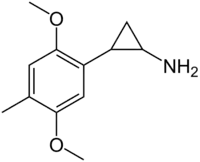2,5-Dimethoxy-4-methylphenylcyclopropylamine
2,5-Dimethoxy-4-methylphenylcyclopropylamine (DMCPA) is a lesser-known psychedelic drug and a substituted amphetamine. DMCPA was first synthesized by Alexander Shulgin. In his book PiHKAL, the dosage range is listed as 15–20 mg and the duration is listed as 4–8 hours.[1] DMCPA produces open-eye visuals, anorexia, and psychedelic dreams. Shulgin gives it a +++ on the Shulgin Rating Scale.
 | |
 | |
| Names | |
|---|---|
| Preferred IUPAC name
2-(2,5-Dimethoxy-4-methylphenyl)cyclopropan-1-amine | |
| Identifiers | |
CAS Number |
|
3D model (JSmol) |
|
| ChEMBL | |
| ChemSpider |
|
PubChem CID |
|
| UNII | |
CompTox Dashboard (EPA) |
|
InChI
| |
SMILES
| |
| Properties | |
Chemical formula |
C12H17NO2 |
| Molar mass | 207.273 g·mol−1 |
Except where otherwise noted, data are given for materials in their standard state (at 25 °C [77 °F], 100 kPa).
Infobox references | |
Legality
United Kingdom
This substance is a Class A drug in the Drugs controlled by the UK Misuse of Drugs Act.[2]
Pharmacology
Very little data exists about the pharmacological properties, metabolism, and toxicity of DMCPA.
References
- DMCPA Entry in PiHKAL
- "UK Misuse of Drugs act 2001 Amendment summary". Isomer Design. Retrieved 12 March 2014.
| Phenethylamines |
|
|---|---|
| Amphetamines |
|
| Phentermines |
|
| Cathinones |
|
| Phenylisobutylamines | |
| Phenylalkylpyrrolidines | |
| Catecholamines (and close relatives) |
|
| Miscellaneous |
|
This article is issued from Wikipedia. The text is licensed under Creative Commons - Attribution - Sharealike. Additional terms may apply for the media files.